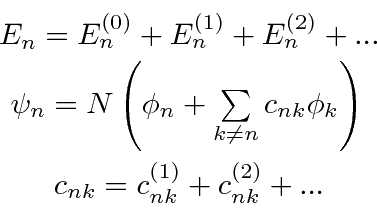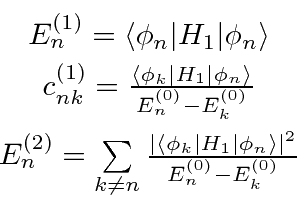Next: The Fine Structure of Up: Course Summary Previous: Addition of Angular Momentum Contents
Assume we have already solved and an energy eigenvalue problem and now need to include an additional term in the Hamiltonian.
We can use
time independent perturbation theory
to calculate corrections to the energy eigenvalues and eigenstates.
If the Schrödinger equation for the full problem is


By solving the Schrödinger equation at each order of the perturbation series, we compute the corrections to the energies and eigenfunctions. We just give the first few terms above.

A problem arises in the case of degenerate states or nearly degenerate states.
The energy denominator in the last equation above is small and the series does not converge.
To handle this case, we need to rediagonalize the full Hamiltonian in the subspace of nearly degenerate states.

We will use time independent perturbation theory is used to compute fine structure and hyperfine corrections to Hydrogen energies, as well as for many other calculations. Degenerate state perturbation theory will be used for the Stark Effect and for hyperfine splitting in Hydrogen.
Jim Branson 2013-04-22